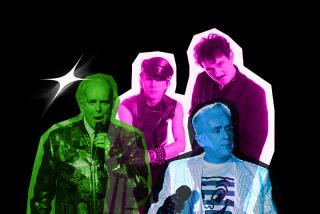Is It Live, or Is It Ultramarine? : Pop music: The band fuses traditional English ballads, jazz and electronic grooves in an effort to ‘blur the boundaries between what’s electronic and what’s live.’
- Share via
Every generation has had its progressive folk luminaries--Fairport Convention in the ‘60s, Pentangle in the ‘70s--so why shouldn’t kids raised on Pac-Man have their own folk band too, electronic-style?
“Ultramarine’s intention is to blur the boundaries between what’s electronic and what’s live. We want to turn the whole thing into one organic lump,” says Paul Hammond, keyboardist and bassist for the English duo, which fuses traditional ballads, jazz and emotional electronic grooves into a unique hybrid.
“We are on the boundaries of dance music,” Hammond continues, “but we don’t arrange the songs for the dance culture. I don’t know where to place our music. We don’t feel particularly affiliated with one scene. We feel happy floating in the middle, taking bits and pieces from everywhere and linking them up.”
“United Kingdoms,” Ultramarine’s third album, garnered critical praise and earned it a well-received spot on alternative star Bjork’s recent U.S. tour. The group, one of the few new electro-ambient bands to be signed to a major label (Giant), is also receiving heavy rotation on eclectic radio stations such as L.A.’s KCRW-FM.
Both Hammond and his partner in Ultramarine, keyboard technician and guitarist Ian Cooper, grew up in Maldon, an old rural town on the east coast of England, about 50 miles from London.
Says Hammond, “It was nice to be secluded from the hub of things, and also be close enough to get to London if you needed to. Musically, it was good ‘cause you could do what you like without having to delve into every new fashion.”
Cooper, 27, and Hammond, 28, teamed up in their mid-teens, united by a common interest in such bands as New Order, Echo & the Bunnymen and Gang of Four.
“It was really an exciting period and quite innovative as well,” recalls Hammond. “The New Order scene was very crucial to us, the bleak and minimalistic approach. You didn’t actually have to know how to play, you could create a mood with very few notes. To a lot of people our age making electronic music, that sort of bleached-out, stripped-down sound was a great influence.”
Cooper and Hammond moved to London with their hometown band A Primary Industry in 1985, and put out a few releases on a small English label before forming Ultramarine in 1989. They released their first album, “Folk,” in 1990, then followed it up with 1992’s “Every Man and Woman Is a Star.”
The new album features up to nine additional musicians, often improvising, on everything from accordion to saxophone to violin.
“It creates a random element with all sorts of possibilities,” says Hammond. “We use other players because writing stuff on the computer can make the music very staid . . . If you’re not careful, you can lose the natural flow of music. We like mixing it up to keep the human element in there.”
“United Kingdoms” also features the vocals of English rock cult-figure Robert Wyatt, from the seminal late-’60s experimental band Soft Machine, on two songs.
“We approached him with the concept of singing old folk ballads,” says Hammond. “We stole the idea from Traffic--they did one song where they took the lyrics off an old ballad and treated it with their own music. . . . We went hunting for street or working ballads, ones that had specific relevance. The songs we picked seemed fresh and had direct parallels to people’s concerns nowadays, even though they were written over 150 years ago.”
More to Read
The biggest entertainment stories
Get our big stories about Hollywood, film, television, music, arts, culture and more right in your inbox as soon as they publish.
You may occasionally receive promotional content from the Los Angeles Times.









